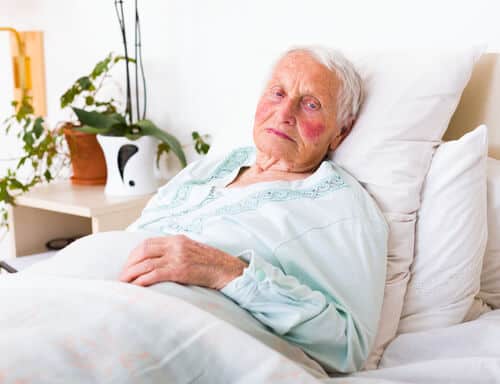Bedsore Injuries
Last updated Tuesday, November 21st, 2023

Bedsores (also referred to as pressure sores, decubitus ulcers or pressure ulcers) are one of the most dangerous yet preventable types of nursing home injuries. And while it is possible for nursing home residents to develop bedsores even when they receive excellent care, far too great a percentage of these cases are the result of simple negligence. Contact the law firm of Wocl Leydon, LLC in Stamford or Bridgeport to learn about your legal options for pressure sore injuries suffered in nursing homes, hospitals or other institutional care.

Get Your FREE Case Review,
In Person or Virtually Online
Bridgeport Nursing Home Negligence Lawyers: Call 203-333-3339
Pressure sores are a serious risk for anyone of limited immobility due to physical or neurological impairment, hospitalization or old age. The annual incidence of decubitus or bedsores has been estimated to fall between 17 and 28 percent for patients in nursing homes, with a lower rate experienced in hospitals.
The combination of advanced age and immobility can be especially dangerous: one study found that pressures sores occurred in 36 percent of people over 65 hospitalized for hip fracture. In 2006, more than 500,000 people nationwide were hospitalized with pressure sores as a primary or secondary diagnosis.
Bedsores develop in stages:
- At Stage One, the skin is not broken but is red or discolored, with no fading of the discoloration within 30 minutes of the time that pressure is removed.
- At Stage Two, the epidermis or topmost layer of the skin is broken, creating a shallow open sore, which may or may not be accompanied by drainage. The important thing to recognize is that bedsores at either of these first two stages of development can be effectively treated.
- At Stage Three, all layers of the skin are destroyed with blackening around the edges, but there is little or no damage to the underlying muscle or bone tissue.
- In Stage Four, the destruction has penetrated to subcutaneous tissues, which can be plainly visible through the open wound.
In Connecticut, pressure sores that progress to Stages Three or Four are considered nursing home or hospital ” never events” – meaning they should never be allowed to happen. In these more advanced stages, patients can develop a variety of serious and life-threatening complications, including sepsis, abscesses, osteomyelitis and bacteremia.

Get Your FREE Case Review,
In Person or Virtually Online
Skilled Representation Inside and Outside of the Courtroom
Although many nursing home abuse and neglect claims can be effectively resolved through normal settlement procedures, a large percentage of claims are vigorously disputed by nursing care providers and their insurance companies. The trial lawyers of Wocl Leydon know how to present the evidence of negligence necessary to overcome the defense objections on issues of liability or damages.
For a free consultation about the ways experienced trial attorneys can help you hold nursing homes, hospitals or other institutions accountable for negligence resulting in decubitus, contact the Bridgeport and Stamford bed sore injuries attorneys at Wocl Leydon
We represent clients statewide and handle nursing home abuse and neglect cases on a contingency basis. There are no legal fees to pay unless we win.

